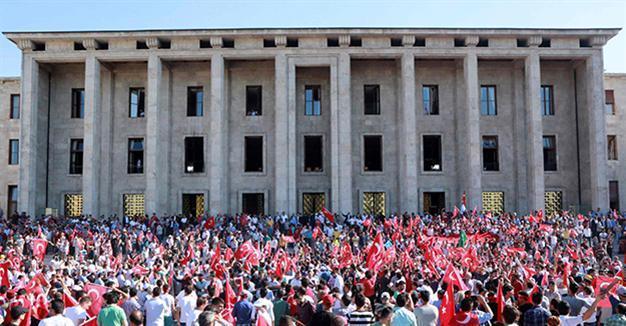Defense systems to protect Turkey’s parliament, presidential palace
ANKARA

AFP photo
Defense systems will be installed at Turkey’s presidential palace, Prime Ministry and parliament in order to enhance security against threats, after Ankara’s most strategic buildings were targeted by fighter jets during the July 15 failed coup attempt.“Necessary measures are being taken not only at the presidential complex but also at the Prime Ministry and the TBMM [Grand National Assembly of Turkey],” Presidential spokesperson İbrahim Kalın said during an interview with broadcaster TGRT Haber on July 27.
“[The presidential complex] is, thank God, a safe place. Thousands of citizens go there every day for the democracy watch. It has a festive mood,” Kalın said, adding that security measures were being taken with helicopters and planes.
Reports by broadcaster NTV suggest that national air defense systems will be installed at the presidential palace, the parliament and the Prime Ministry’s Çankaya mansion. The self-propelled air defense gun system Korkut and the pedestal-mounted Zıpkın and Atılgan stinger systems – all developed by the country’s leading defense manufacturer ASELSAN – will be used to secure the sites.
Meanwhile, Turkish parliament’s security manager, Salim Uslu, confirmed to daily Milliyet that additional security measures were being taken but said they would not single-handedly introduce a missile defense system.
“There could be considerations to install remote-controlled missile launchers or shoulder-launched Stinger missiles, a signal jammer or a radar at the presidential palace, Prime Ministry, parliament and Ankara’s other important buildings. But these should be evaluated altogether. A decision has not been reached yet,” he said, adding that these complexes should be protected like the U.S. Congress or the White House.
Uslu said security at the gates of the parliament was being strengthened as a first step. An 80-centimeter-high and 27-centimeter-wide steel wall will be built at parliament’s entrance to secure the area against acts of terror as well as traffic problems.
The manager also said parliament’s bunkers would be renovated to be prepared for use, if the need arises.
Uslu said the new system would allow parliament to operate even if the general assembly was hit.
During the failed coup attempt, believed to have been organized by followers of U.S.-based Islamic scholar Fethullah Gülen, the Ankara police headquarters was attacked by jets and helicopters while the Gölbaşı special forces department headquarters was bombed by a pro-coup aircraft, killing 17 police officers and two personnel from satellite operator Turksat.
The events were followed by a total of 13 soldiers, including three senior officers, being detained while attempting to enter the Presidential Palace in Ankara. Shortly after, the Turkish parliament was targeted by jets and helicopters in an attack by the pro-coup soldiers, resulting in more than 10 injuries.
















